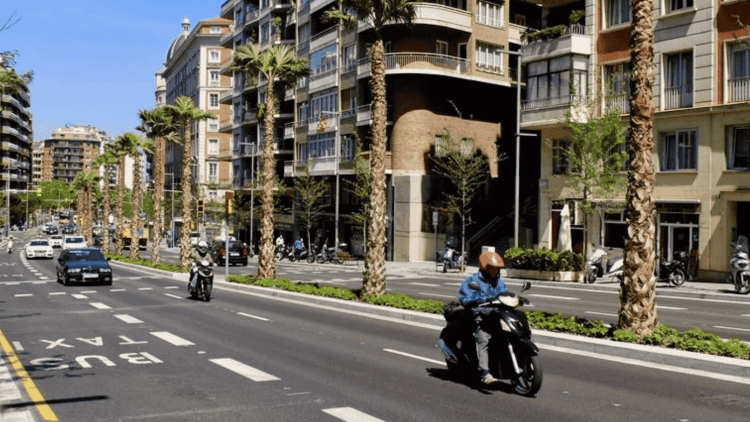Publication of invitation to tender
Reducing the number of accidents involving motorbikes
Barcelona City Council, in collaboration with the Commissioner’s Office for the 2030 Agenda, BIT Habitat and Fira de Barcelona, and through the Tomorrow.Mobility World Congress, is launching a challenge for businesses, start-ups, universities and innovation centres to put forward solutions that will help to cut the number of accidents involving motorbikes.
Barcelona is one of the European cities with the largest presence of motorbikes and mopeds on its streets, as these vehicles offer greater flexibility for regular short and medium-distance journeys in Barcelona. Motorbikes and mopeds account for 33.3% of all vehicles in Barcelona. Specifically, motorbikes represent 27.2% and mopeds 6.1%.
Defined as low-volume and high-occupancy vehicles, they offer multiple advantages when it comes to getting around the city, such as flexibility of use, low consumption and the fact that they take up little space in public streets, whether parked or in motion. In contrast, the accident rate for these vehicles is a negative aspect which needs to be resolved and which has become one of the biggest road safety challenges for Barcelona.
There were 23 deaths from traffic accidents in Barcelona in 2022. Motorbike and moped riders accounted for 16 of these, equating to 70%. Riders also represented 86.3% of serious injuries among riders and drivers, according to the road accident figures from Barcelona City Council for the first six months of 2022.
Recognising the urgency of this matter and with the goal and need to cut the number of accidents among motorbike and moped riders in an innovative and effective way, an urban challenge has been launched by the name of “Reducing the number of accidents involving motorbikes”.
The idea behind the challenge is to promote the achievement of the Sustainable Development Goals (SDGs) in the 2030 Agenda, specifically the following:
- SDG 3: Good health and well-being
- SDG 9: Industry, innovation and infrastructure
- SDG 16: Peace, justice and strong institutions
-
This call is seeking the best solutions to the urban challenge “Reducing the number of accidents involving motorbikes”, increasing road safety in the city for both motorcyclists and all other people travelling around the city, either on foot or by means of other vehicles.
The challenge seeks solutions with:
- Innovative components that set them apart: using innovative methodologies and resources in terms of their approach and execution.
- High impact: with a demonstrable impact and quantifiable return which endures in time.
- Able to be implemented in the short term: maximum duration of 18 months between implementation and monitoring.
-
Solutions can be geared towards resolving the problem from one of both of the following perspectives.
- DRIVING BEHAVIOUR
Solutions relating to driving behaviour must have the format required to achieve the goals and be applied to the public infrastructure where required.
Solutions must have the capacity to affect motorcyclists’ behaviour, influencing their conduct. This logic is inspired by the theory of nudging, which seeks to modify the architecture of individual decisions in an effort to change people’s conduct. In this context, solutions must intervene in the way motorcyclists ride and limit anti-social or dangerous conduct on roads, and/or discourage the use of motorbikes for journeys which can be undertaken on public transport, by bike or on foot.
- TECHNOLOGICAL INNOVATION
An innovative tech solution should have a significant tech component which can be applied in physical spaces (public infrastructure), on vehicles (the motorbike), on people (riders) or a combination of these. By tech we understand the sum of techniques, skills, methods, materials and processes used in the production of assets and services. In this respect, the solution or set of solutions may be digital in character, but not necessarily so.
At the pilot stage, the solutions must adapt to current regulations.
-
The challenge is aimed at the following groups, acting jointly or individually:
- Micro-enterprises and small enterprises
- Start-ups
- Cooperatives
- Innovation and research centres
- Universities
- Foundations
- Joint ventures between legal persons
-
- Total amount available: €200,000
- Funding of up to 80% of the eligible project costs (with a maximum of €100,000 eligible for subsidy)
- Testing of an innovative solution in a real environment in the city of Barcelona
- Possibility of using space at the trade fair facilities in Montjuïc
- Communication and visibility for winning solutions
- Project presentation at the Tomorrow.Mobility World Congress 2023
- Dissemination and connection with the innovation ecosystem
- Publication of call: 20/01/2023
- Deadline for presentation of proposals: 01/03/2023 (12:00 GMT +1)
Download here the call for applications and the necessary forms to apply for the challenge.
You’ll find all the documents with information on the call here. You can find more information and the call announcements here.
TAKE PART
Present your proposal by email: bilm@firabarcelona.com
(You can also use this email address for any doubts and queries up until 14 February 2023)
Further information at Tomorrow.Mobility World Congress.

